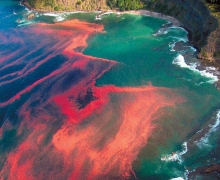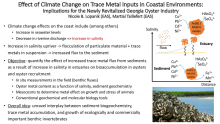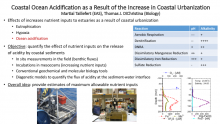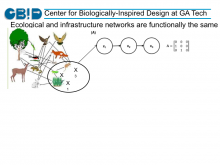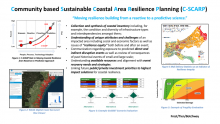Single-celled marine algae are especially chemically rich, producing toxins that kill fish, marine mammals, and seabirds, contaminate shellfish, and threaten human health. Many predators of these algae – copepods – selectively consume less toxic algae, which in turn sense copepods via an excreted blend of copepod-specific molecules. These algae then become up to 20X more toxic when they sense copepod cues in the open ocean.
The effects of climate change on the coastal ocean include a decrease in riverine inputs and increase in salinity in estuaries with impacts on primary production, macrofauna, and sediment biogeochemistry that are poorly understood. One clear effect of the increase in salinity associated with the decrease in riverine discharge, however, is the enhanced coagulation of inorganic material further upriver. Flocculation of particulate material upriver will enhance its flux to the sediment and simultaneously decrease the outflux of particulate material to the continental shelf.
The urbanization of the coast is generating significant environmental issues, including increasing nutrient runoff that promotes eutrophication and hypoxic conditions in estuaries. At the same time, the excessive input of nutrients is also responsible for an increase acidification of coastal waters, as denitrification in sediments typically generates acidity.
Creating sustainable and resilient cities depends on understanding the properties of food, energy, water and other infrastructure networks. Ecological network analysis ENA is a tool that can be used to understand the connections between network structure, material and energy flow, and resilience. ENA is increasingly applied to both understand and design more sustainable and resilient human infrastructure.
This study seeks to develop a location independent scalable framework for Community based Sustainable Coastal Area Resilience Planning (C-SCARP).
The data-driven framework is adaptable to other locations and/or scales in the future. The proposed C-SCARP framework will make use of an adapted and expanded version of the GoldSET suite of decision support tools that incorporates multi-criteria analysis in a sustainability evaluation framework. Three distinct uses of GoldSET are anticipated:

